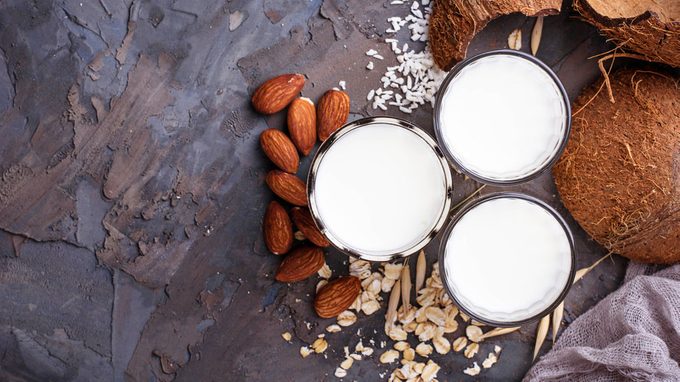Is Dairy-Free Milk Damaging Your Brain?
There are plenty of health benefits which can be found in the dairy-free diet – but missing this key nutrient is not one of them.

Is the growing popularity of alt-milks a good thing?
There’s no denying that there’s a reason people drink milk alternatives. Statistically speaking, you probably have some sort of difficulty digesting dairy. According to the U.S. National Library of Medicine, approximately 65 per cent of the world’s population has a reduced ability to digest lactose, a sugar commonly found in dairy products.
There are plenty of alternatives out there, whether it’s almond milk, cashew milk, or just plain malk, so lactose intolerance is far from a dietary death sentence. But there might be reason to be cautious when making the switch.
The downside of dairy-free
As reported by the Independent, people who opt for milk alternatives run the risk of developing an iodine deficiency.
Iodine is commonly found in dairy products, seafood, and, go figure, iodized table salt. The mineral plays a key role in stimulating your thyroid glands in hormone development and the hormones, in turn, play a key role in cognitive growth and function—so much so that the World Health Organization considers iodine deficiency as the most preventable cause of brain damage.
The findings are based on new research from the University of Surrey which examined the iodine content of 47 milk-alternative drinks. The milk alternatives, including soya, almond, coconut, rice, oat, hazelnut, and hemp, had, on average, just two per cent of the iodine content of regular cow’s milk.
What’s the deal with iodine?
“Many people are unaware of the need for this vital dietary mineral,” Margaret Rayman, a professor of nutritional medicine at the University of Surrey told the Independent.
“It is important that people who consume milk-alternative drinks realize that they will not be replacing the iodine from cows’ milk, which is the main U.K. source of iodine.”
Rayman went on to explain that milk alternatives only provide two micro milligrams of iodine per serving, just a fraction of the recommended daily consumption for adults, which 150 micro milligrams.
She also explained that pregnant women, in particular, should take notice, because their recommended iodine consumption is up to 200 micro milligrams per day. Iodine plays a crucial role in fetal cognitive development, according to the World Health Organization.
A way to solve this iodine problem is through supplementing your diet with other iodine-rich foods or by taking a vitamins – just make sure not to make these vitamin mistakes.
There are plenty of things to keep an eye on health-wise, so it’s best to stay informed about what can happen to your body when you don’t consume dairy.




